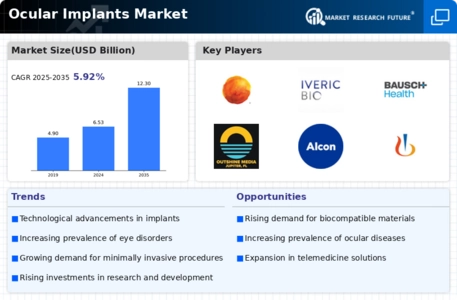Increasing Healthcare Expenditure
The Global Ocular Implants Market Industry is benefiting from rising healthcare expenditures across various regions. Governments and private sectors are investing more in healthcare infrastructure, which includes advanced surgical facilities and ocular care services. This trend is particularly evident in developing countries where healthcare access is improving. Enhanced funding allows for the procurement of advanced ocular implants and training for healthcare professionals, thereby increasing the number of successful surgeries. This growing investment is likely to sustain a compound annual growth rate of 5.93% from 2025 to 2035, further solidifying the market's expansion.
Rising Prevalence of Eye Disorders
The Global Ocular Implants Market Industry is witnessing a surge in demand driven by the increasing prevalence of eye disorders such as cataracts, glaucoma, and macular degeneration. According to health statistics, millions of individuals are affected by these conditions, necessitating surgical interventions and the use of ocular implants. As the global population ages, the incidence of these disorders is expected to rise, further propelling the market. In 2024, the market is projected to reach 6.53 USD Billion, reflecting the urgent need for innovative ocular solutions to address these growing health challenges.
Growing Awareness and Preventive Care
There is a notable increase in awareness regarding eye health and preventive care, which is positively impacting the Global Ocular Implants Market Industry. Educational campaigns and initiatives by health organizations are encouraging individuals to seek regular eye examinations and timely treatments for eye conditions. This heightened awareness leads to earlier diagnoses and a greater likelihood of surgical interventions, thereby increasing the demand for ocular implants. As more people recognize the importance of eye health, the market is expected to experience sustained growth, with an anticipated market value of 6.53 USD Billion by 2024.
Aging Population and Demographic Shifts
The demographic shift towards an aging population is a critical driver for the Global Ocular Implants Market Industry. As life expectancy increases, the prevalence of age-related eye diseases is also rising, leading to a higher demand for ocular implants. Older adults are more susceptible to conditions such as cataracts and retinal diseases, necessitating surgical solutions. This demographic trend is expected to contribute significantly to market growth, with projections indicating a market size of 12.3 USD Billion by 2035. The need for effective ocular interventions for this population segment is likely to shape the future landscape of the industry.
Technological Advancements in Implant Design
Innovations in ocular implant technology are significantly influencing the Global Ocular Implants Market Industry. Advances in materials science and engineering have led to the development of biocompatible and more effective implants, enhancing patient outcomes. For instance, the introduction of smart implants that can monitor intraocular pressure represents a leap forward in glaucoma management. These technological improvements not only improve the quality of life for patients but also expand the range of surgical options available to ophthalmologists. As a result, the market is expected to grow substantially, with projections indicating a value of 12.3 USD Billion by 2035.


















